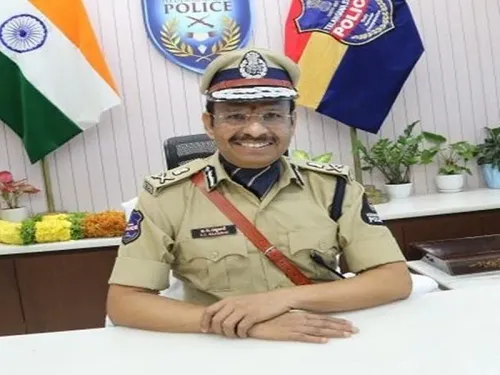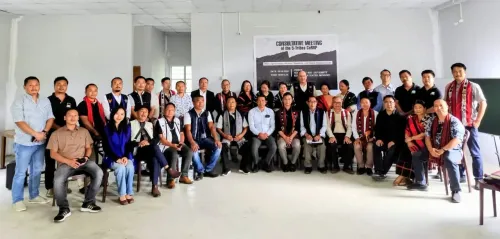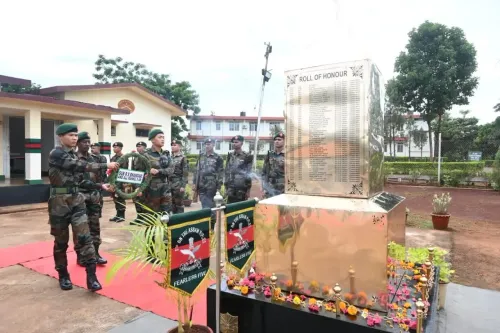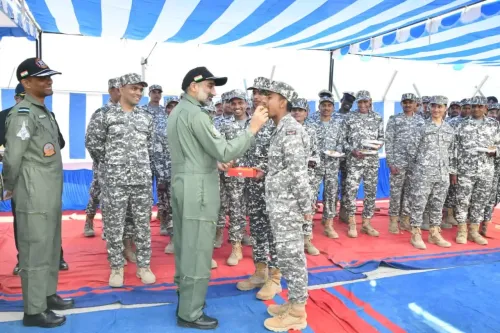What Insights Did Shashi Tharoor Share at Oxford and London Lectures Organized by OP Jindal Global University?
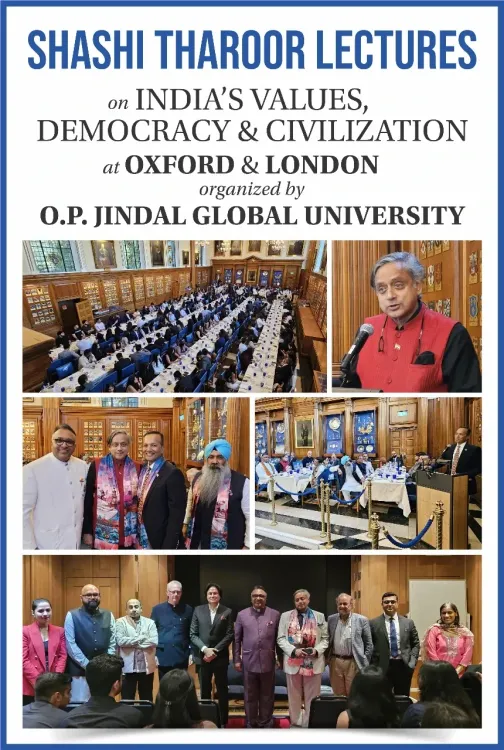
Synopsis
Key Takeaways
- Dr. Tharoor emphasized the lessons from India's 2,500-year-old civilization.
- The Indian Constitution is a living document that requires continual protection and renewal.
- Social justice and equality are central to India's democratic ethos.
- Global cooperation is essential for addressing contemporary challenges.
- Education, economy, entrepreneurship, energy, and equality are vital for India's future.
Oxford/London (UK), July 9 (NationPress) In a series of prestigious lectures and discussions conducted in the United Kingdom, Dr. Shashi Tharoor, a prominent Member of Parliament, delved into the lasting teachings from India’s civilizational heritage and the significant evolution of the Indian Constitution at 75.
His lectures provided a profound insight into the path of India’s constitutional democracy, highlighting its achievements in safeguarding rights and freedoms, as well as the challenges that lie ahead as India nears its centenary of independence in 2047.
These pivotal events were orchestrated by O.P. Jindal Global University (JGU), recognized as India’s leading private university and an Institution of Eminence. The lectures took place at University College, Oxford, Somerville College, Oxford, and at the Honourable Society of the Inner Temple in London.
At University College, Oxford, Dr. Tharoor presented a captivating lecture themed: “An Immemorial Civilization: Lessons from India, Lessons for India.”
He guided the esteemed audience through a journey spanning over 2,500 years of Indian history, underscoring the nation’s rich legacy of religious tolerance, non-violence, and social justice. "Lessons can be gleaned from India’s historical and mythical figures, alongside modern reformers and leaders like Vivekananda and Mahatma Gandhi. India's secularism and egalitarianism are deeply rooted in its ancient wisdom. No nation can claim to be democratic and progressive if it fails to address the injustices faced by the marginalized and oppressed. At its most radiant moments, Indian civilization has accomplished just that, and our pursuit for modern equality has always been a struggle against orthodoxy, casteism, superstition, and fundamentalist exclusion,” Dr. Tharoor asserted.
He further elaborated, “Our mission is not solely to remember India, but to reimagine it—drawing from our deep-rooted inheritance the ethical resolve to confront contemporary inequities with courage, conviction, and moral clarity, ensuring greater rights for the disenfranchised and those on the margins of our society.”
In his address, Dr. Tharoor articulated how, since the era of Ashoka, the illustrious Mauryan emperor, the Indian ethos has championed not just tolerance but acceptance.
“India and its memorial civilization hold vital lessons for the world today: that one is free to strive, seek, and arrive at one’s own conception of the Almighty. The greatest truth is acknowledging the existence of other truths! As Vivekananda stated, Hinduism is a religion that has imparted to the world not just tolerance, but acceptance.”
At Somerville College, Oxford, Dr. Tharoor compellingly traced the evolution of the Indian Constitution in a lecture titled “Indian Constitution at 75: Protecting Rights, Expanding Freedoms & Empowering Citizens.”
He underlined the continual significance of the Constitution’s foundational ideals in steering India through complex and diverse aspirations.
“Our Constitution symbolizes not only a legal framework but a social contract that has unified our diverse nation. As we commemorate 75 years of its adoption, we must recommit to defending the rights and freedoms it guarantees for every citizen,” Dr. Tharoor remarked.
Professor (Dr.) C. Raj Kumar, Founding Vice Chancellor of O.P. Jindal Global University, introduced Dr. Tharoor at the events and emphasized the importance of global dialogue on constitutional values, democratic governance, and sustainability.
“This event at Oxford reinforces our belief that universities must play an active role in shaping democratic societies. The Indian Constitution is a living testament to the strength of democratic ideals, and Dr. Tharoor’s insights remind us of the necessity to protect, expand, and renew these values across generations and borders,” Professor Kumar stated.
He added, “Dr. Tharoor is a preeminent public intellectual, author, and a beacon of the democratic process in India, having been elected four times from his constituency! This occasion celebrates intellectual engagement and institutional purpose. Dr. Tharoor’s impactful lecture inspires us to reaffirm our dedication to democratic values and global cooperation. As a global university, we take pride in assembling thought leaders and changemakers who will shape the future of our world.”
The discussions were further enriched by a response from Professor (Dr.) Shailendra Raj Mehta, O.P. Jindal Distinguished University Professor, who provided academic commentary and broader perspectives on the challenges and opportunities of constitutional governance.
JGU’s Sustainable Development Report 2025 was also unveiled during the event by Professor Padmanabha Ramanujam, Dean of the Office of Academic Governance at JGU. The report emphasizes the university’s steadfast commitment to advancing the United Nations Sustainable Development Goals (SDGs) through its teaching, research, and institutional practices.
The event commenced with welcome remarks by Professor (Dr.) Radhika Khosla, Research Director at the Oxford India Centre for Sustainable Development.
At the Honourable Society of the Inner Temple in London, O.P. Jindal Global University hosted another public lecture by Dr. Tharoor on the theme: “India at 2047: The Future of the World’s Largest Democracy.”
Sharing profound insights into the current state of Indian democracy, its institutional milestones, and the vital need for vigilance in safeguarding its constitutional values, Dr. Tharoor remarked: “India’s democratic journey has been both remarkable and resilient, yet it faces serious challenges in the years ahead. Institutions are important, but the spirit behind those institutions is even more crucial.”
He added, “I commend O.P. Jindal Global University for promoting essential dialogues on democracy and development at the global stage.”
Naveen Jindal, Chancellor of O.P. Jindal Global University and Member of Parliament (Lok Sabha), India, also spoke to the distinguished audience. He stressed the importance of a forward-thinking vision for India in 2047, grounded in five core values:
Education: “Especially primary education, as a solid foundation is crucial. Initiating two universities—O.P. Jindal Global University and O.P. Jindal University in Chhattisgarh, which specializes in engineering—is just a small step.”
Economy: “India’s economy must be robust, one that generates jobs and wealth for the nation. It requires extensive action, risk-taking, investment, and entrepreneurship.”
Entrepreneurship: “The private sector in India is fueled by dynamic individuals. We need to nurture them and show greater respect for wealth creators.”
Energy: “Our future must increasingly rely on clean, renewable, and sustainable energy. Empowerment entails access to affordable energy for both the affluent and the underserved.”
Equality: “This embodies the essence of true democracy, which lies in ensuring equality of opportunity for all 1.4 billion citizens.”

